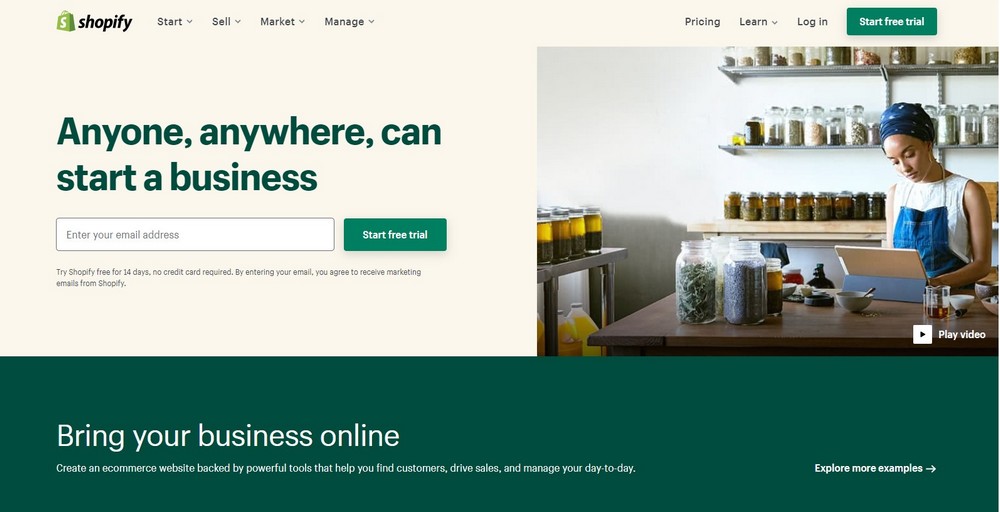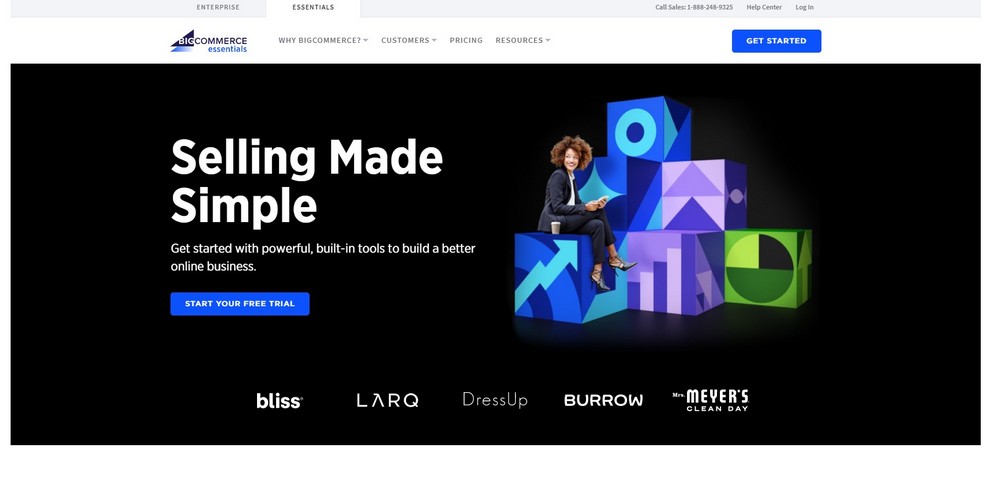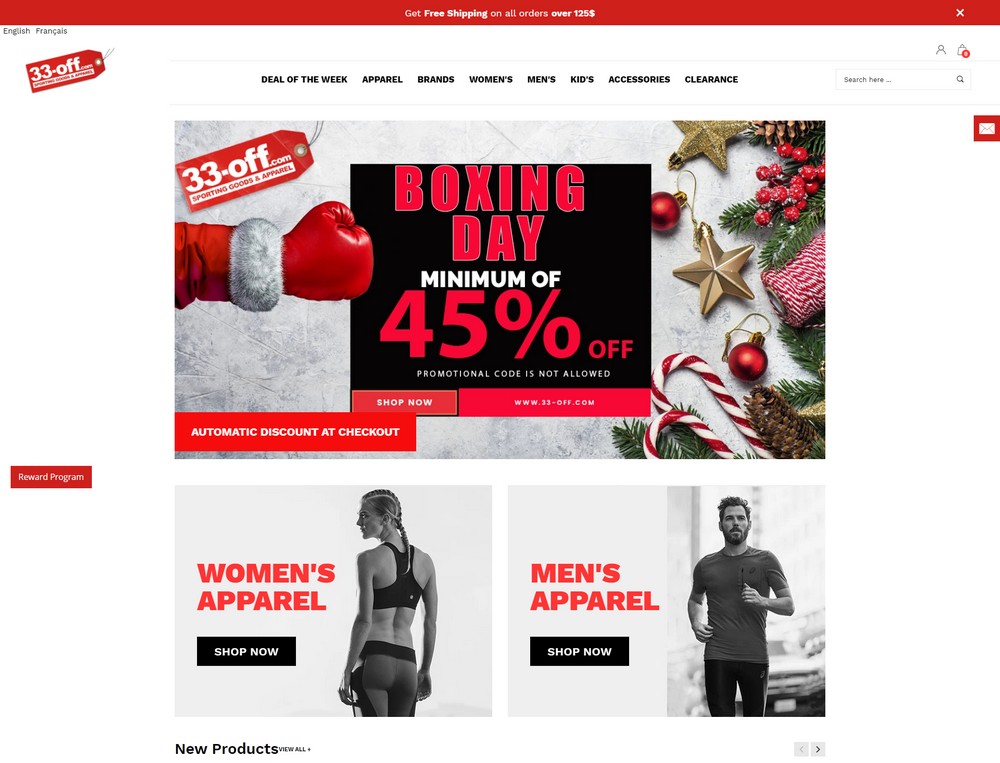Shopify vs BigCommerce: Which Is Best For Beginners In 2025?
There are many different tools and platforms for building websites. But when it comes to building eCommerce shops, two popular platforms come out on top of every list—Shopify and BigCommerce.
Both platforms are perfect for building an online store. Strangely enough, they offer basically the same features, making Shopify and BigCommerce look almost identical. Although, there is clearly a better choice among the two.
In this guide, we’ll help you pick the best platform to build your online shop by taking a closer look at Shopify and BigCommerce while comparing their best features. Let’s get started.
Shopify
Shopify is one of the most popular eCommerce platforms for building online shops for selling your products. Shopify was founded in 2006 and today it serves over 1 million merchants around the world who have made more than $200 billion in sales.
Shopify is a platform that’s most suitable for small to medium businesses. As well as for solopreneurs who are looking for a simple all-in-one solution to launch their own products and shops.
Themes and Shop Designs
(Example: Dowse Design, a shop made with Shopify)
Shopify offers a large collection of free and premium themes in its official theme directory. You’ll find beautiful designs to make shops in many different niches and categories.
Third-party marketplaces like ThemeForest also has hundreds of premium Shopify themes for giving your shop a more professional and unique look.
You can also easily customize and edit your shop layouts using the Shopify live editor. There’s no coding involved.
Apps and Third-Party Integrations
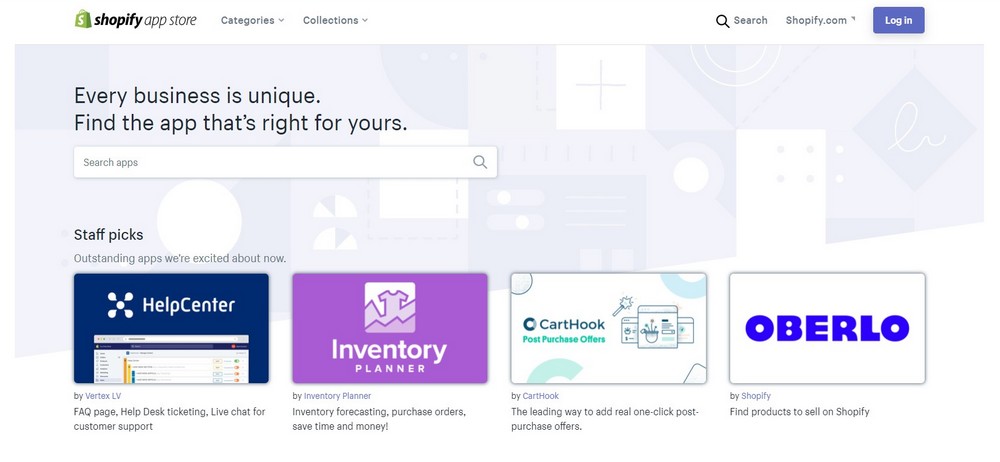
Shopify gives you access to all kinds of apps for adding additional features to your shop and connecting with third-party services. There are apps for upselling, offering better local deliveries, customer support, and more. There are also apps for easily setting up dropshipping stores.
Benefits of Using Shopify
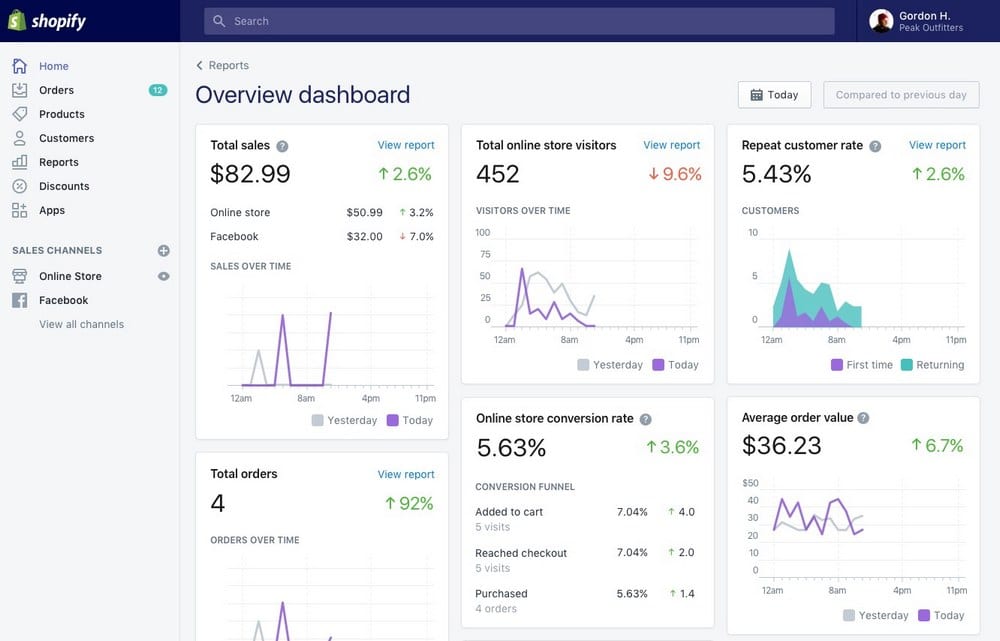
- Shopify can be used to sell anything you want from physical products to digital downloads and even subscriptions
- Integrate with Facebook, Instagram, Amazon, and eBay to sell your products on multiple platforms
- Easily manage your inventory, order fulfillment, shipping, and taxes using the beginner-friendly user interface
- Use the Point of Sale (PoS) system to sell products in-person at events, popups, cash on delivery, and more
- Has a cheaper plan for selling only on social media platforms
Downsides to Using Shopify
- Shopify charges a hefty additional transaction fee for using third-party payment providers
- The platform lacks advanced SEO features
How Much Does Shopify Cost?
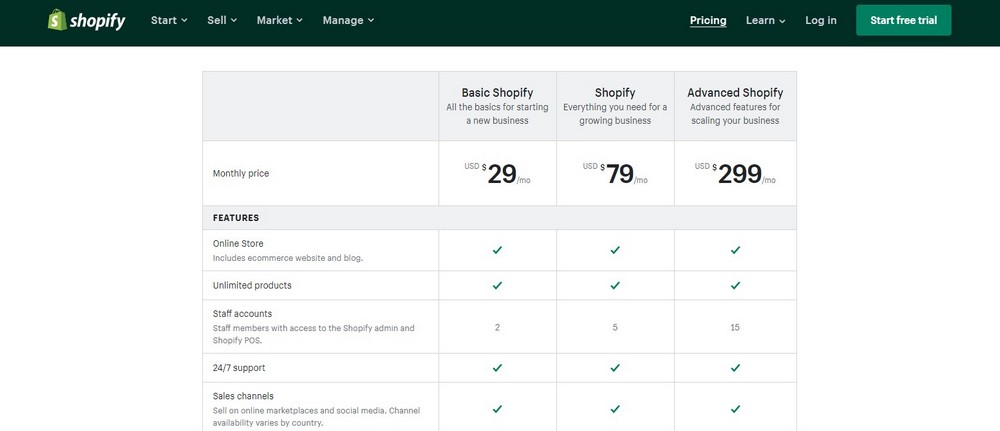
Shopify offers several pricing plans that are suitable for different sizes of businesses. The main difference between these plans is the decreasing amount of the platform transaction fees you have to pay for using third-party payment providers.
- Basic Shopify: This plan costs $29 per month and gives access to 2 staff accounts with a platform fee of 2.0%
- Shopify: This plan costs $79 per month and gives access to 5 staff accounts with a platform fee of 1.0%
- Advanced Shopify: This plan costs $299 per month and gives access to 15 staff accounts with a platform fee of 0.5%
- Shopify Lite: This plan costs $9 per month and it only allows you to sell products on Instagram and Facebook
Platform Fees
When using Shopify Payments to process credit card payments, the platform will charge 2.9% + 30¢ USD from each online sale. And 2.7% + 0¢ USD from in-person PoS sales.
If you’re using a third-party payment provider, Shopify will charge an additional 2% from each sale on top of the fees charged by your payment provider.
BigCommerce Essentials
BigCommerce is a popular eCommerce solution that specifically targets enterprise-level businesses. BigCommerce Essentials is a new stripped-down version of the enterprise solution made for small to medium businesses.
BigCommerce Essentials was introduced as a way to rival Shopify. The platform offers the same features and tools with lots of added benefits.
One of the biggest selling points of BigCommerce Essentials is that it does not charge a transaction fee for using third-party payment providers.
Themes and Shop Designs
(Example: 33-off, a store made with BigCommerce)
BigCommerce also has a themes directory full of stylish shop designs. However, most of the themes are premium designs that could cost you upwards of $150.
You can find BigCommerce themes from third-party marketplaces but there aren’t as many themes available for BigCommerce as on Shopify.
Apps and Third-Party Integrations
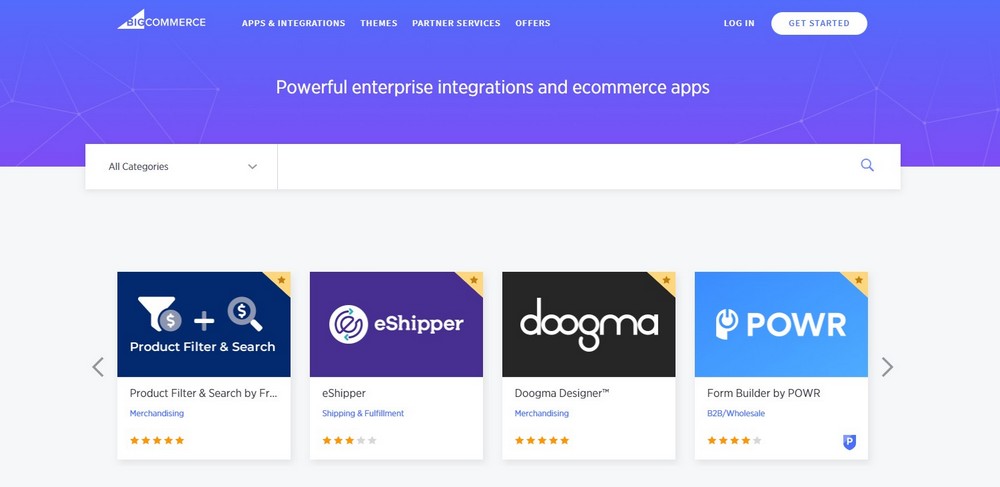
Similar to Shopify, BigCommerce also has an app marketplace where you can find various third-party integrations and useful extensions to make your store better and generate more sales.
Although, most of the apps on the platform come with a monthly recurring fee. For example, Spocket, the dropshipping app on BigCommerce is free to install but it adds a $24 per month fee.
Benefits of Using BigCommerce
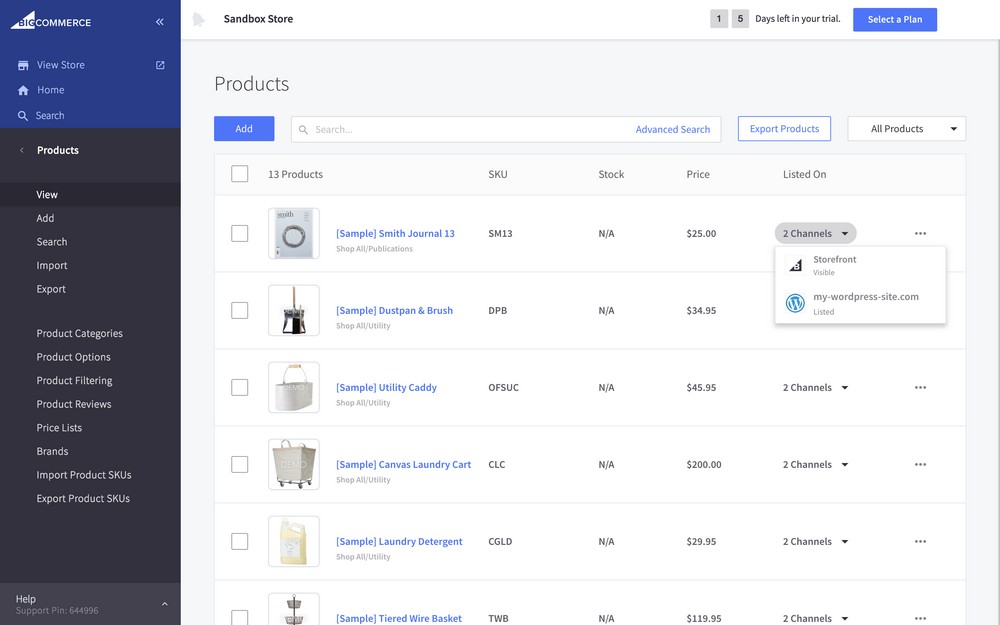
- Similar to Shopify, BigCommerce also allows you to sell everywhere, including Facebook, Instagram, Amazon, eBay, and Google Shopping
- BigCommerce also offers advanced tools for customizing your store design using the easy-to-use page builder
- The platform provides extensive SEO features like URL editing and Google AMP support for ranking your store pages on Google
- BigCommerce doesn’t have a built-in PoS system but it integrates well with Square PoS
Downsides to Using BigCommerce
- BigCommerce puts a limit on the number of sales you can generate per year. You can only generate $50K worth of sales per year using the standard pricing plan
- Having to pay a recurring fee for using apps is another downside to using BigCommerce
- BigCommerce also lacks a proper selection of theme designs
How Much Does BigCommerce Cost?
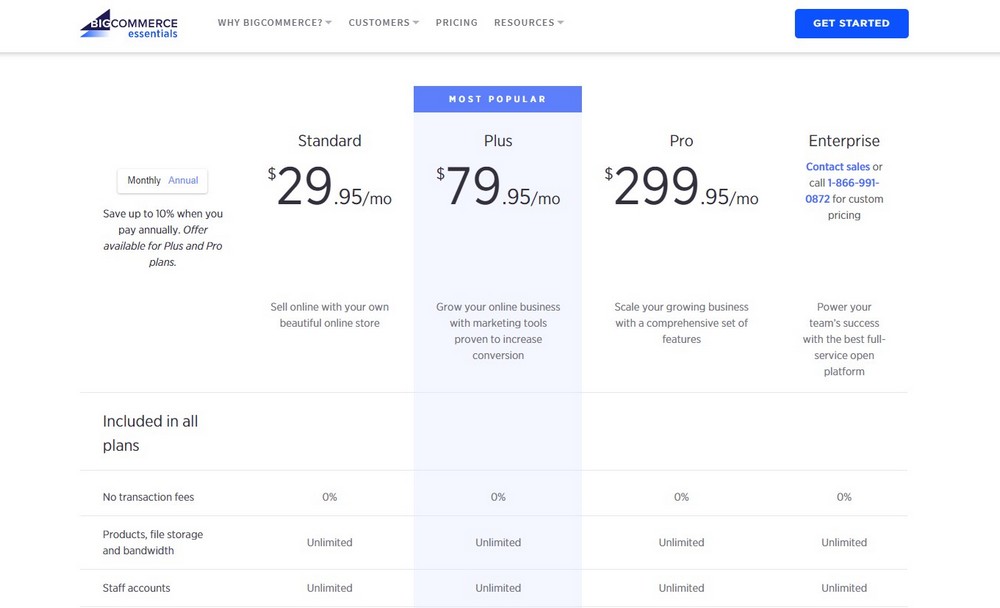
BigCommerce pricing plans are quite similar to Shopify. The main difference between the plans is the number of sales you can generate per year.
- Standard: At $29.95 per month, this plan includes zero transaction fees and lets you sell up to $50K worth of products each year
- Plus: At $79.95 per month, this plan includes zero transaction fees and lets you sell up to $180K worth of products each year
- Pro: At $299.95 per month, this plan includes zero transaction fees and lets you sell up to $400K worth of products each year
Platform Fees
Unlike Shopify, BigCommerce doesn’t charge a platform transaction fee for using third-party payment providers. It even offers special credit card processing rates from PayPal when using Braintree.
Shopify or BigCommerce: Which Platform is Better?
At a glance, both Shopify and BigCommerce seem to have very similar features. And yes, they both provide you with all the necessary tools for building an online store. As well as selling products across social media, Amazon, and eBay.
However, there are a few key differences that separate Shopify and BigCommerce in a very distinctive way.
While BigCommerce doesn’t charge a platform transaction fee, it also puts a limit on the number of sales you can generate per year. BigCommerce also lacks more choices in theme designs. And it doesn’t have a built-in PoS system either.
Shopify, however, has slightly higher transaction fees when using third-party payment providers. But you have the freedom to generate as much revenue as you can.
Shopify also gives you access to its PoS system and lets you choose from hundreds of theme designs. And, more importantly, Shopify’s most useful apps are free to use. Including the dropshipping app, Oberlo.
For these reasons, we believe Shopify is the better platform for building an online store to sell your own products and also for dropshipping.
